Season 4’s ‘Hush’ is one of the most famous and acclaimed episodes of Buffy the Vampire Slayer. Upon receiving feedback that Buffy was only successful due to its witty dialogue, Joss Whedon took it upon himself to write and direct an episode that would, for the majority of the runtime, be silent. He was concerned viewers would find the episode boring, but actually it was quite the opposite. It ended up being the only episode of Buffy nominated for an ‘Outstanding Writing for a Drama Series’ Emmy. So the risk certainly paid off.
‘Hush’ is essentially a dark fairytale involving a group of demons called the Gentlemen. The imposing, suited demons float into Sunnydale one night and steal everyone’s voices, ensuring that the next night, when they start cutting out people’s hearts, they can’t scream for help. Disturbing, right? Metallic, fixed smiles and the skeletal structure of the Gentlemen’s bodies make them look truly horrifying. Their aesthetic is almost Victorian, with the black suits, leather surgical bags, and uptight composure.
Alongside the Gentlemen are their strange demonic companions; fast and erratic-moving creatures wearing straitjackets. The association with mental illness as a scare factor is obviously problematic, but the unpredictable way in which they move contrasts nicely against the restrained and controlled movements of the Gentlemen. These creatures hold down the victims while the Gentlemen cut their hearts out too. *shudder* Apparently, Whedon based this off a nightmare he had as a child, in which he was in bed and approached by a floating monster.
One moment that stands out as particularly spine-chilling is when Olivia (Giles’ girlfriend) looks out of the window at night and sees one of the Gentlemen float right past, staring and smiling emptily at her. Being inexperienced with monsters and the supernatural, Olivia’s presence (as well as Tara’s, but I’ll get into that later) is a great way of channelling naive, raw fear for the audience.
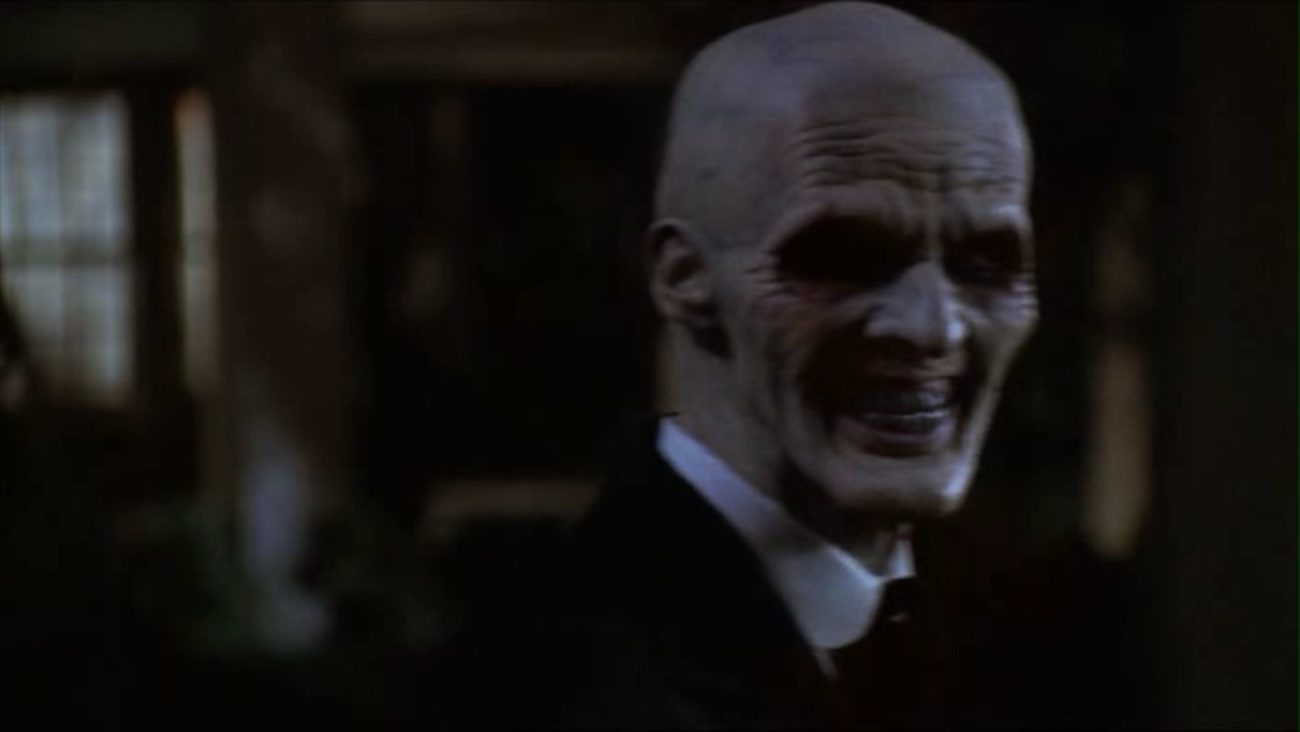
In terms of the general vibe of the villains and episode in general, there’s a certain fairytale quality to it. The Gentlemen are quite literally fairytale creatures, as Giles’ research on them involves consulting a book of fairytales. I love the lore of the Gentlemen and their quest; collecting seven hearts specifically is very fantasy/adventure horror-like. Cutting Sunnydale off from the rest of the world via a quarantine also serves to restrict the storytelling to one town. This is usually the case in fairytales, being focused on one village or kingdom as opposed to being universal. It almost personifies the town itself, giving it a whimsical and mystical element to it. This is especially suited to Sunnydale, as it fits in with the idea of the town being somewhat cursed due to the Hellmouth.
Even the episode’s score sounds mystical and fairytale-like. Christope Beck, Buffy’s Season 2 to 4 composer, is responsible for the wonderful accompaniment. The use of violins and occasional sweet vocals connotes innocence in the face of danger—this feels representative of Tara and Olivia’s roles in the narrative. However, it could also signify Buffy herself in regards to how the outside world perceives her. She appears as an inoffensive young woman who would normally embody the role of damsel in distress, centred in a world of violence and death. Obviously, she very much isn’t, but more on that in a bit.
Speaking of the Slayer, ‘Hush’ begins with Buffy having a dream in class. It involves cryptic phrases and proverbs such as “fortune favours the brave”, and Riley saying “if I kiss you it’ll make the sun go down”. These sayings seem to link to an overall narrative relating to Buffy’s role as the Slayer, and attempting to navigate a budding relationship alongside that. A child (who looks rather like a younger version of Buffy, perhaps intentionally) starts to sing a nursery rhyme about the Monsters of the Week:
“Can’t even shout
Can’t even cry
The gentlemen are coming by
Looking in windows
Knocking on doors
They need to take seven and they might take yours
Can’t call to mom
Can’t say a word
You’re gonna die screaming but you won’t be heard”
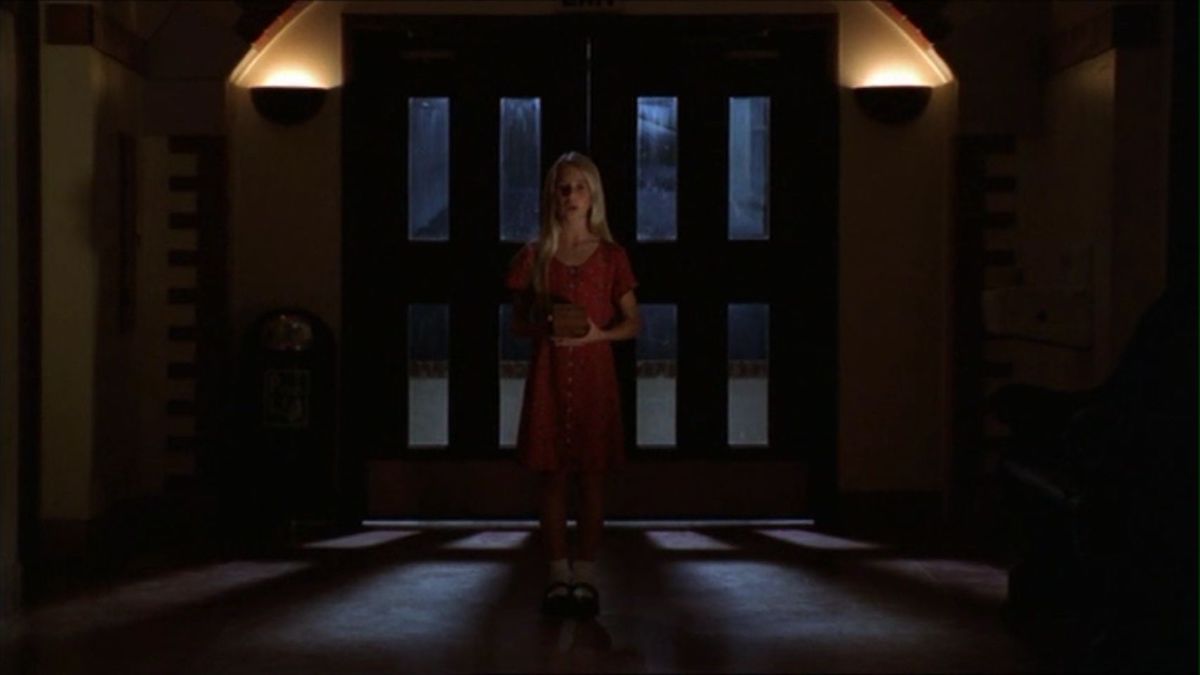
Whedon clearly got the memo that children in horror settings make everything creepier, because the scene is haunting. Giles muses that it could have been one of Buffy’s Slayer-ific prophetic dreams—although they’re rather on the nose, it’s interesting every time this bit of lore pops up. It’s an efficient, if obvious narrative technique, but also places Buffy firmly in the realm of the supernatural, as well as isolating her from her friends and positioning her closer to the demons.
Intersecting traditional fairytales with Slayer lore also reframes the narrative of the fairytale. The foundation of Buffy’s character is a defiance of expectations; she writes her own story, deviating from the framework which she’s been given. In regards to both being the Slayer and her role in the fairytale narrative, Buffy represents a gender role subversion. She’s the ‘princess’ in the story, but one that can physically fight and cause fatal damage to the enemies, in the form of making their heads explode with a scream—talk about cool. Her ‘prince’ (Riley) is merely the sidekick. He even hinders the battle at the end by misinterpreting the object Buffy is telling him to destroy, instead smashing a jar next to it. This clumsiness contrasts nicely against the composed, graceful Gentlemen, as well as contributing to the main theme.
“So this is what it is; we’re talking about communication. We’re talking about language—not the same thing.”
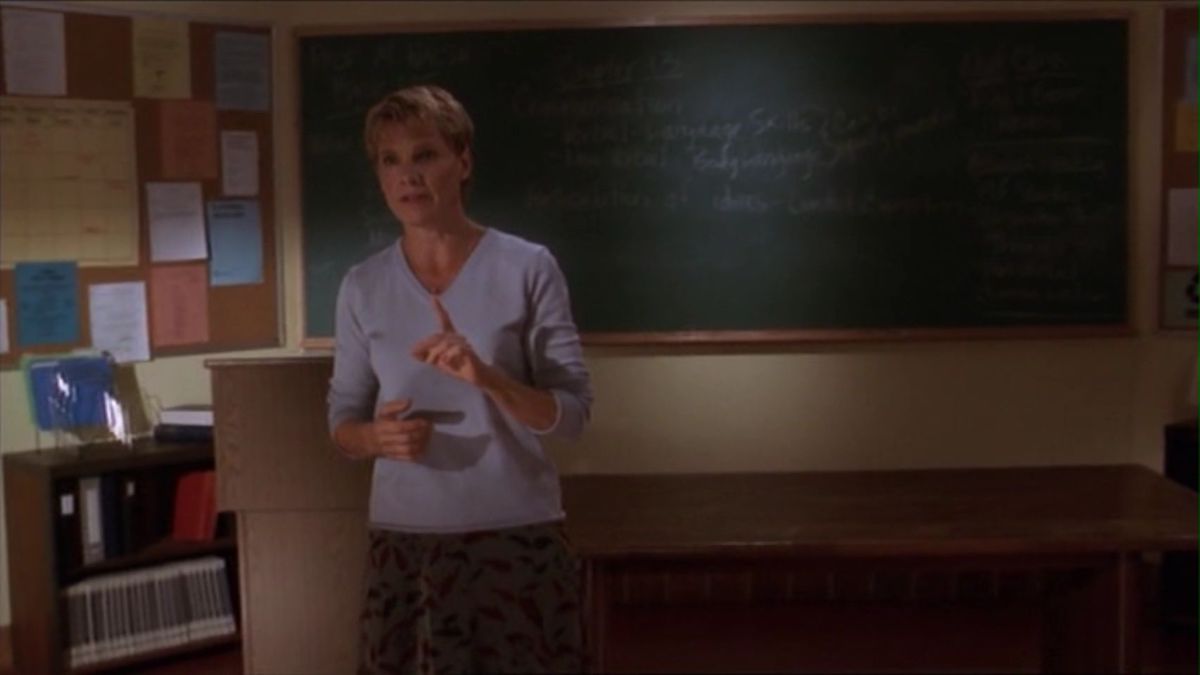
In the very first dialogue of ‘Hush’, Maggie Walsh addresses the central theme: communication. Verbal communication and communication via physicality and touch are both utilised effectively across the course of the episode. In their essay on ‘Hush’, Buffy academics Alice Jenkins and Susan Stuart discuss the shift from locutionary to perlocutionary acts throughout the episode. Locutionary refers to language with intended meaning that ultimately does not engage the listener, whereas perlocutionary means ideas that are instantly acted upon in a meaningful way.
During the initial 14-minute speaking segment of ‘Hush’, conflict is set up between various pairs of characters. Buffy and Riley are a few steps away from starting a relationship, but they can’t stop babbling meaningless information to one another. Xander and Anya are arguing since Xander is struggling to express his fondness for Anya in words. Willow is part of a Wicca group that are “all talk” and no active magic. The root issue of all these disputes is speaking; either empty words, too many words, or miscommunication with said words. Talking is actually hindering everyone’s relationships rather than solving any problems. That, and also that no one is really listening.
Let’s break these conflicts down into more detail. At the start of the episode, Buffy has an intimately romantic/sexual dream about Riley that involves a significant lack of talking. In real life, every time the two of them have a conversation, it turns into a “babblefest”. They can’t seem to pick the right words, and what they do say is blatant lies. At this point, neither of them have spoken about who they really are (Buffy being the Slayer and Riley being G.I. Joe), therefore their relationship can’t progress. Their first interaction after losing their voices involves a hug and a kiss; removing speech as an option simplifies the situation and strips it back to their innate feelings.
During the final battle with the Gentlemen (more on them later) at the end, Buffy and Riley finally come face to face—or rather crossbow to crossbow—as their true selves. Seeing each other in action without being able to verbally explain, but automatically fighting side by side was the necessary bonding moment. In the aftermath, once they can speak again, Riley says, “I guess we have to talk”. Buffy agrees, but the two of them end up sitting in silence. Simply watching events unfold and getting on with what needed to be done was far less complicated than having to try find the right words.
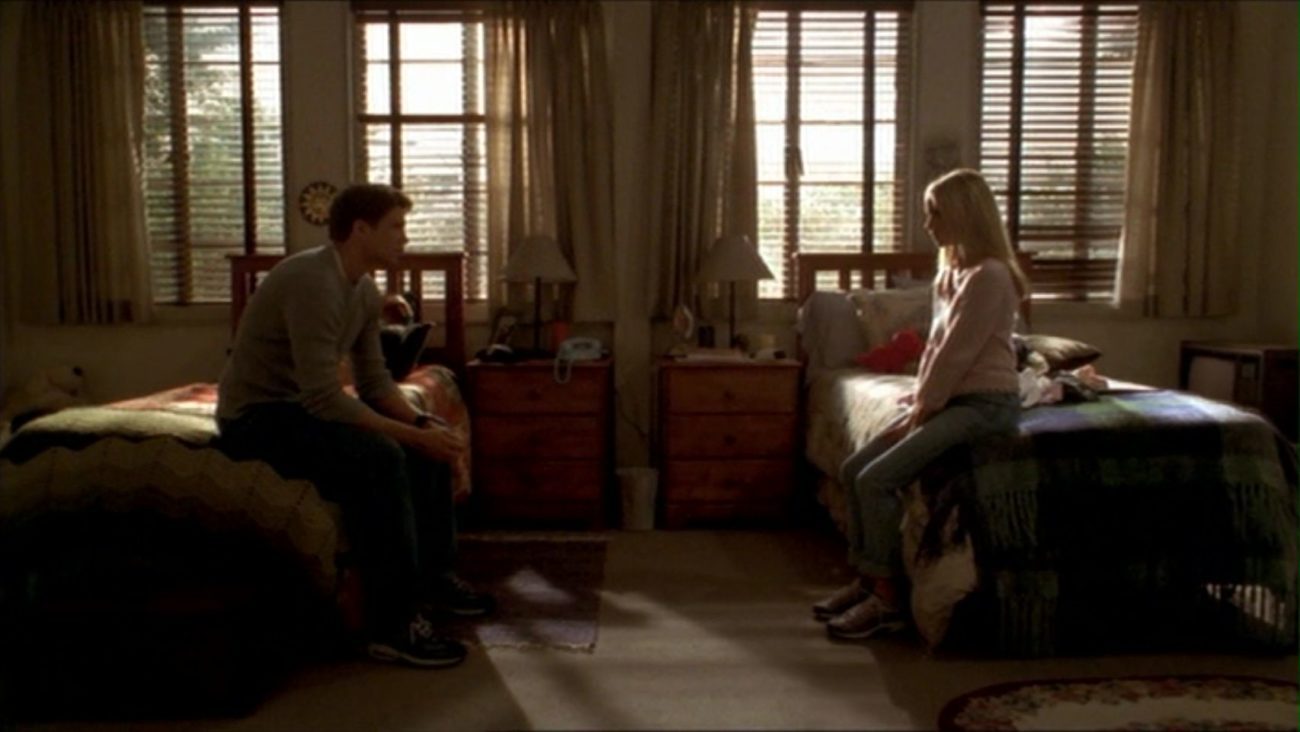
Rather the opposite of Buffy and Riley’s situation is Giles and his girlfriend Olivia’s subplot. She’s visiting from England, and shortly after arriving says to Giles, “that’s enough small talk, don’t you think?” before instigating sex. No verbal communication is required since their relationship is very casual. However, the external circumstances of the Gentlemen’s arrival severs their personal connection instead of strengthening it. This time, it’s not a result of speech being removed, but simply that Olivia didn’t know that monsters were real and is scared off by this discovery. With Buffy and Riley, their mutual acknowledgement that they both know monsters are real acts as a catalyst for inciting their relationship. What brought Buffy and Riley together drove a wedge between Giles and Olivia.
The other official couple at this point in the show is Xander and Anya. They start the episode mid-argument; Anya doesn’t believe Xander cares about her, but he can’t seem to find the words to express that he does. Amusingly, they charge into Giles’ house uninvited during their altercation, much to his chagrin. Xander berates Anya for not understanding “private conversations”, and Giles as well as Spike soon get involved in the quarrel. As a side note, Spike’s relation to the theme of communication is pretty much that he won’t shut up. When staying at Xander’s place, he imitates Anya arguing with him while he’s trying to get to sleep. It’s hilarious for us, but obviously Spike’s incessant digs only exacerbate the situation.
Ironically, Spike inadvertently contributes to Xander and Anya making up. During the silence, Anya takes a nap while Spike is drinking blood from a mug. The scene is framed in such a way from Xander’s perspective that it appears as though Spike has just killed Anya. It’s a wonderful moment of misinterpretation. Fraught with anger and grief, Xander launches himself at Spike before Anya stops him. His actions managed to prove to Anya just how much he cares for her, which solves their dispute. Just like Buffy and Riley, actions spoke louder than words.
The circumstances of ‘Hush’ also cause Willow to meet and bond with her future girlfriend, Tara. At the start of the episode, Willow is part of a college Wicca group who frustrate her a lot. The way she describes it to Buffy is “Talk. All talk.”; the other ‘witches’ do plenty of chatting and praying, but no actual spells or actions. It’s notable that during the meeting, Tara attempts to make a suggestion but is spoken over and mocked. Communication is being used inadequately, to everyone’s detriment.
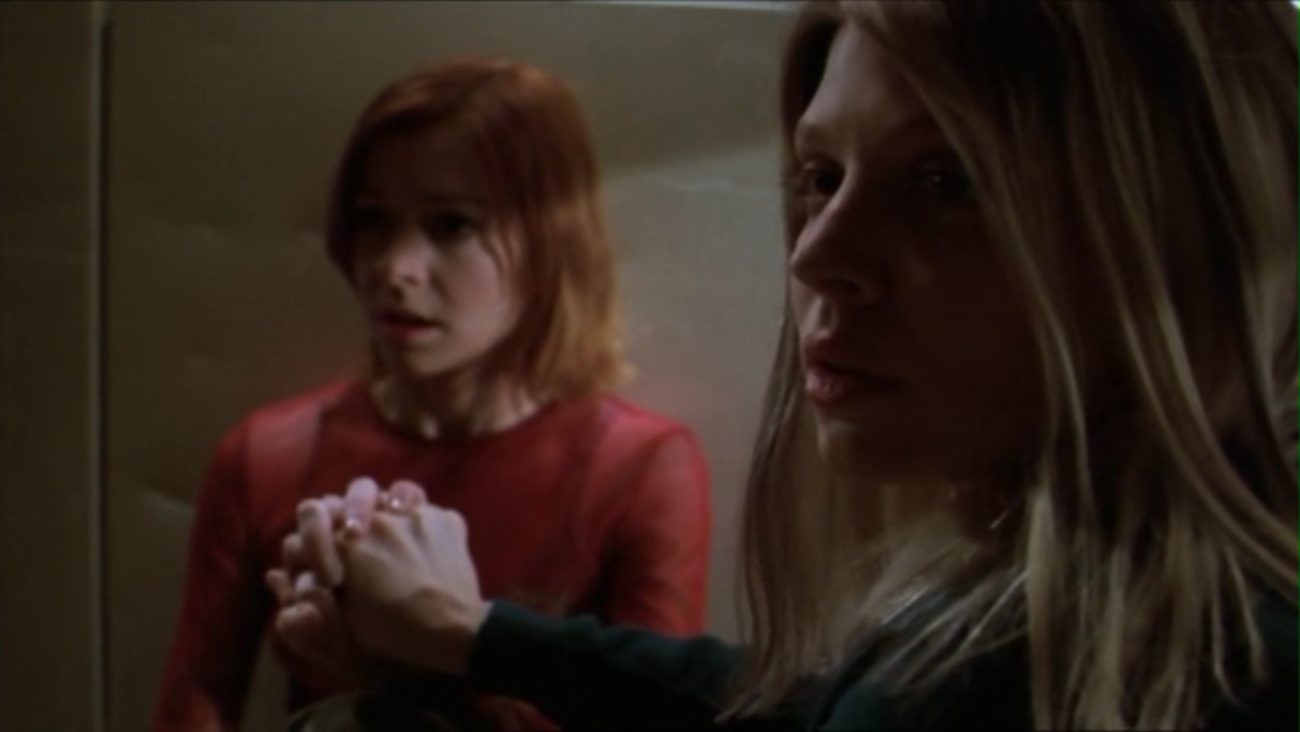
While unable to speak, Tara tracks down Willow to try a spell that will allow everyone to speak again, as we later find out. Although this doesn’t happen, the two witches combine their power using touch to protect themselves from the Gentlemen. As with Buffy and Riley, a bond is forged entirely through physical contact. Not only this, but Willow has found a way to advance her magical ability, which is what she sought in the Wicca group.
Touch is used to convey platonic/familial affection between characters too. In the first Scooby gang meeting after the silence begins, Giles gives Buffy a reassuring shoulder squeeze and Willow a little hug. Responsive smiles are given to reciprocate. It’s an intimate moment used to communicate love and support between these characters, especially with Giles being the comforting father figure of the group.
Aside from these sincere character interactions, the lack of sound is cleverly utilised in ‘Hush’ to comment on how we interact with the world around us. A rather isolated but significant moment in the episode is when Tara comes downstairs into the lounge area at college the first morning that everyone has lost their voices. Many students have gathered there, but are obviously in total silence, except the slight sniffling sounds of some people crying. Then, a guy drops a bottle by accident. The smashing sound is so jarring that it makes some people jump, and causes a general feeling of discomfort. It’s only a small moment, but it does an excellent job of demonstrating how reliant people are on sound to fill in the gaps, and just how unused to silence we are. In terms of our main characters, Xander’s first port of call is to ring Buffy and Willow, quickly realising they can’t speak on the phone. Long-distance communication is therefore immediately ruled out.
As was previously established in the episode, the elevator in the Initiative headquarters uses voice recognition software. When Riley and Forrest can’t speak, the security measures in place cause a fatal-looking gas to be released inside the elevator. Thankfully for them, Maggie Walsh lets them out and disappointedly (but also rather smugly) points to a sign that says ‘in case of emergency use stairway’. It’s a genuinely tense scene that then evolves into a moment of comedic relief, utilising the circumstances very well.
The way in which we see Maggie communicate to the Initiative squad is via a rather advanced computerised voice that projects what she types in. In contrast, Giles uses a more of-its-time method of physically writing on slides for a projector. This difference emphasises the technology vs tradition dichotomy that is a running theme with the butting-heads of the Initiative and Buffy throughout Season 4. Additionally, Riley and other Initiative members have to use pen and paper, which separates Maggie as a distinctively superior figure. Giles, on the other hand, is more on the same level as the Scoobies.
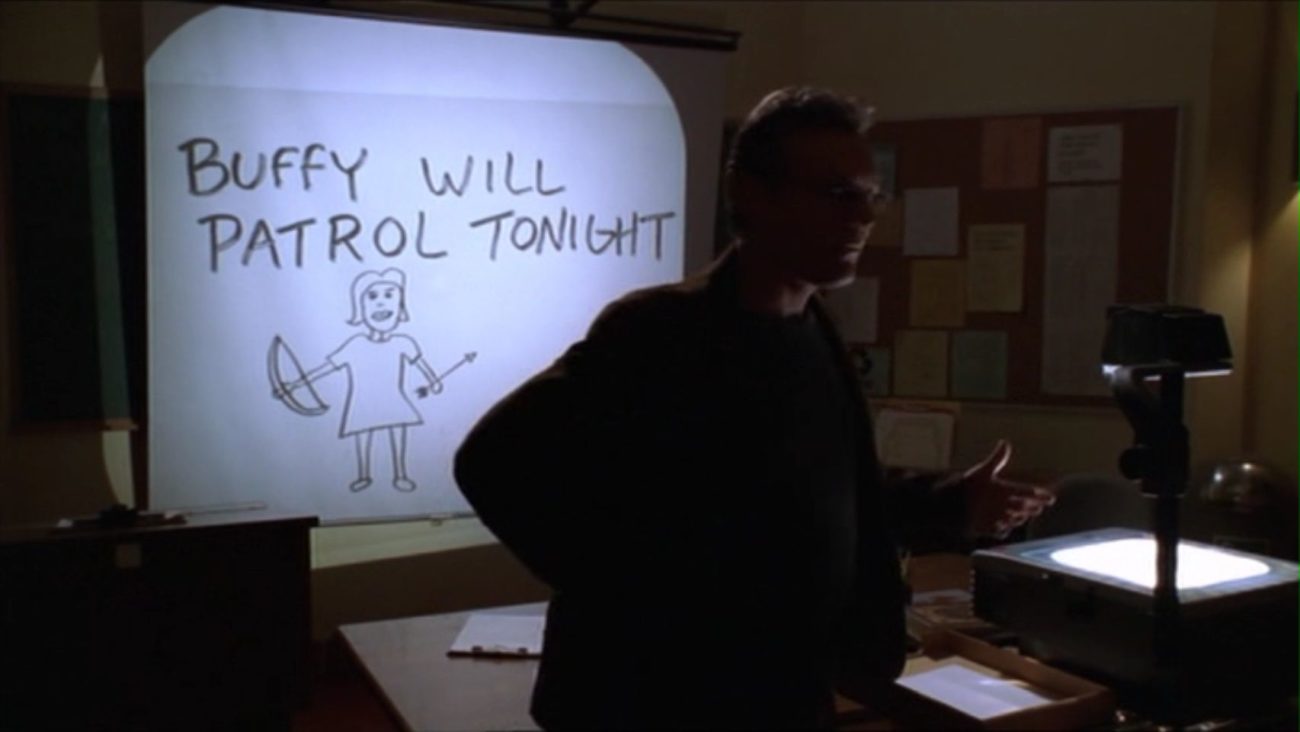
The presentation scene with Giles and the Scoobies is one of the stand-out scenes of ‘Hush’. The projector itself gives me a lot of nostalgia from having used those in school, so I have that personal connection to it. Giles’ little doodles are very cute, and I love that he even put some music on (‘Danse Macabre’ by Camille Saint-Saens) to set the tone. He went to a lot of effort! Anya happily eating popcorn while Giles is showing everyone bloody diagrams of people getting their hearts cut out is very much in character too, and a humorous contrast.
Of course, I mentioned the Anya, Spike, and Xander misinterpretation scene earlier, but during the presentation there are a couple more comedy moments in the same vein. Willow points to her heart to refer to what the Gentlemen want, and Xander mouths “boobies?”—which is very on-brand for Xander. Buffy also intends to mime staking, but it turns out more like a masturbation gesture, as can be gathered from her friends’ responses. Both are examples of classic crude physical comedy, but it works well and provides some lightness amongst the general intensity of the episode.
In regards to the wider world, there’s a level of political commentary surrounding responses to the town-wide silence. A guy starts selling message boards for $10 each the day people lose their voices. Although Buffy and Willow look annoyed at the overpriced product, it cuts to them wearing the boards since they’re aware it’s the best way to communicate. It shows how there’s always people who look for ways to capitalise on tragedy and make a profit off the struggling masses.
Later on, we see a news report on the event, putting it down to a laryngitis outbreak. In the face of direct supernatural events, ignorant people will give any kind of so-called ‘scientific’ explanation, no matter how far-fetched it seems. I mean, can you blame them? There’s nothing more far-fetched than a group of creepy demon men stealing everyone’s voices overnight. Then again, the residents of Sunnydale have a funny way of rationalising all the blatantly supernatural occurrences in their town. There’s also a blink-and-you-miss-it comment in the report about how some blame the outbreak on a recent flu vaccination, and that some sceptics are calling it a “city-wide hoax”. This is an apt acknowledgement of typical politically-charged, conspiracy theory responses to an incident, despite lack of evidence.
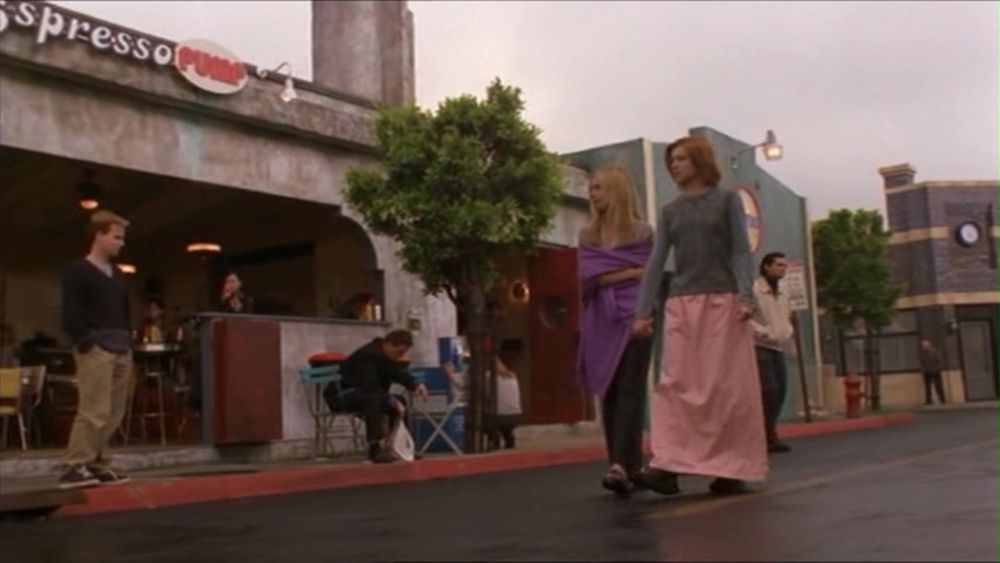
‘Hush’ is an excellently executed episode of Buffy that covers a lot of ground. There’s standard goofy humour, terrifying monsters, a beautiful aesthetic, and thematic explorations that significantly contribute to numerous character journeys. It ticks all the boxes. No wonder it shot to fan-favourite status!

